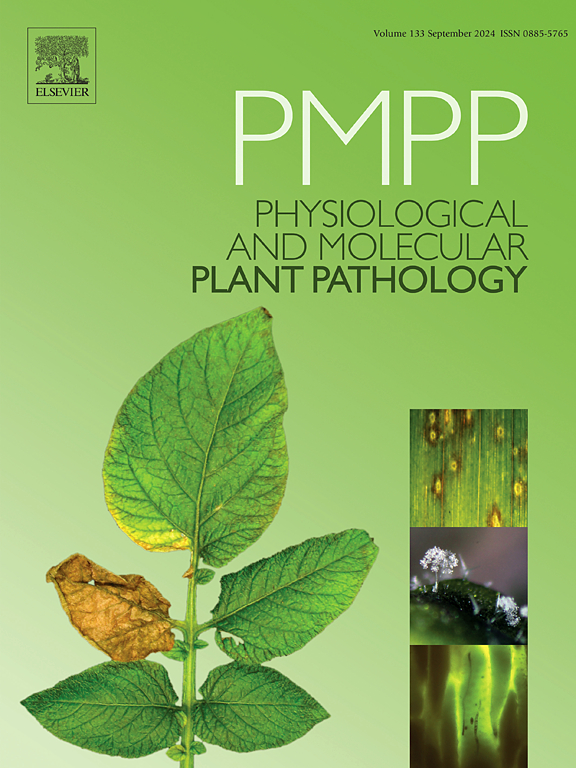组学方法在植物病害管理中的应用综述
IF 3.3
3区 农林科学
Q2 PLANT SCIENCES
引用次数: 0
摘要
植物病害每年造成的全球作物损失高达40%,严重影响粮食安全和农业经济。传统的疾病管理方法往往不足,需要先进的解决方案。基因组学、转录组学、蛋白质组学、代谢组学和表型组学等组学技术通过实现早期病原体检测、加速抗性育种和精确生物防治,改变了植物病理学。这篇综述强调了基因组学驱动的疾病管理的关键进展,强调了它们在现代农业中的变革潜力。基因组学利用下一代测序(NGS)进行病原体诊断、基于crispr的基因编辑和快速抗性基因定位,缩短了育种周期。转录组学利用RNA-Seq和微阵列来解码宿主-病原体相互作用和防御机制,而代谢组学在症状前检测中识别疾病生物标志物和应激反应代谢物的准确率为95%。蛋白质组学通过质谱分析揭示了效应-宿主蛋白的相互作用,从而实现了靶向免疫反应的研究。虽然不太成熟,但表型组学将人工智能、无人机和高光谱成像集成在一起,用于高通量疾病表型分析,提供大规模的非侵入性监测。多组学数据与机器学习的整合产生了植物免疫和病原体行为的预测模型,促进了精确干预。宏基因组学通过分析有益微生物群和使噬菌体治疗能够抵抗耐药病原体,进一步增强生物防治策略。尽管前景看好,但数据复杂性、高成本和监管障碍等挑战依然存在。然而,采用战略性组学可以推动可持续农业,培育适应气候变化的作物,并减少对化学农药的依赖。通过连接基础研究和实地应用,组学技术将重新定义全球作物保护,在气候变化和新出现的植物疾病时代确保粮食安全。本文章由计算机程序翻译,如有差异,请以英文原文为准。
Omics approaches in plant disease management: An insightful review
Plant diseases cause up to 40 % of global crop losses annually, severely impacting food security and agricultural economies. Traditional disease management approaches often fall short, necessitating advanced solutions. Omics technologies such as genomics, transcriptomics, proteomics, metabolomics, and phenomics have transformed plant pathology by enabling early pathogen detection, accelerated resistance breeding, and precision biocontrol. This review highlights key advancements in omics-driven disease management, emphasizing their transformative potential in modern agriculture. Genomics utilizes the next-generation sequencing (NGS) for pathogen diagnostics, CRISPR-based gene editing, and rapid resistance gene mapping reducing breeding cycles. Transcriptomics leverages RNA-Seq and microarrays to decode host-pathogen interactions and defense mechanisms, while metabolomics identifies disease biomarkers and stress-responsive metabolites with 95 % accuracy in pre-symptomatic detection. Proteomics unravels effector-host protein interactions via mass spectrometry, enabling targeted immune response studies. Though less established, phenomics integrates AI, drones, and hyperspectral imaging for high-throughput disease phenotyping, offering non-invasive monitoring at scale. Integration of multi-omics data with machine learning has yielded predictive models for plant immunity and pathogen behavior, facilitating precision interventions. Metagenomics further enhances biocontrol strategies by profiling beneficial microbiomes and enabling phage therapy against resistant pathogens. Despite their promise, challenges like data complexity, high costs, and regulatory barriers remain. However, strategic omics adoption can drive sustainable agriculture, foster climate-resilient crops and reducing reliance on chemical pesticides. By bridging fundamental research and field applications, omics technologies are poised to redefine global crop protection, ensuring food security in an era of climate change and emerging plant diseases.
求助全文
通过发布文献求助,成功后即可免费获取论文全文。
去求助
来源期刊
CiteScore
4.30
自引率
7.40%
发文量
130
审稿时长
38 days
期刊介绍:
Physiological and Molecular Plant Pathology provides an International forum for original research papers, reviews, and commentaries on all aspects of the molecular biology, biochemistry, physiology, histology and cytology, genetics and evolution of plant-microbe interactions.
Papers on all kinds of infective pathogen, including viruses, prokaryotes, fungi, and nematodes, as well as mutualistic organisms such as Rhizobium and mycorrhyzal fungi, are acceptable as long as they have a bearing on the interaction between pathogen and plant.

 求助内容:
求助内容: 应助结果提醒方式:
应助结果提醒方式:


